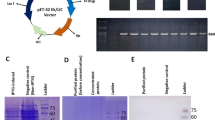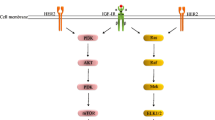Abstract
Objectives
Among the most promising antibody formats in terms of inhibiting carcinogenesis are single-stranded variable fragments, whose targeted binding to the Fzd7 receptor has been proven effective at suppressing tumorigenesis. In this study, we investigated the effectiveness of an anti-Fzd7 antibody fragment against both tumor growth and metastasis of breast cancer cells.
Methods
To develop anti-Fzd7 antibodies, bioinformatics approaches were used and the antibodies were expressed recombinantly in E. coli BL21 (DE3). The expression of anti-Fzd7 fragments was verified by Western blotting. Analysis of the antibody's binding capacity to Fzd7 was conducted by flow cytometry. Cell death and apoptosis were assessed by MTT and Annexin V/PI assays. The transwell migration and invasion assays, as well as the scratch method, were used to evaluate cell motility and invasiveness.
Results
The anti-Fzd7 antibody was expressed successfully as a single band of 31 kDa. It could bind to 21.5% of MDA-MB-231 cells, as opposed to only 0.54% of SKBR-3 cells as negative control. According to MTT assay, induced apoptosis was 73.7% in MDA-MB-231 cells, compared with 29.5% in SKBR-3 cells. Also, the antibody exerted a significant inhibitory effect of 76% and 58% on migration and invasion of MDA-MB-231 cells, respectively.
Conclusion
The recombinantly developed anti-Fzd7 scFv of this study could exhibit significant antiproliferative and antimigratory properties, along with a high apoptosis-inducing potential, making it suitable for the immunotherapy of triple negative breast cancer.



Similar content being viewed by others
Data availability
The authors confirm that the data justifying the findings of this study are available within the manuscript.
References
Chavez KJ, Garimella SV, Lipkowitz S. Triple negative breast cancer cell lines: one tool in the search for better treatment of triple negative breast cancer. Breast Dis. 2010;32(1–2):35–48.
Iranshahi N, Zafari P, Yari K, Alizadeh E. The most common genes involved in epigenetics modifications among Iranian patients with breast cancer: a systematic review. Cell Mol Biol (Noisy-le-grand). 2016;62(12):116–22.
Siegel RL, Miller KD, Jemal A. Cancer statistics 2016. CA: Cancer J Clinicians. 2016;66(1):7–30.
Yao H, Ashihara E, Maekawa T. Targeting the Wnt/β-catenin signaling pathway in human cancers. Expert Opin Ther Targets. 2011;15(7):873–87.
Yang L, Wu X, Wang Y, Zhang K, Wu J, Yuan YC, et al. FZD7 has a critical role in cell proliferation in triple negative breast cancer. Oncogene. 2011;30(43):4437–46.
Fredriksson R, Lagerström MC, Lundin LG, Schiöth HB. The G-protein-coupled receptors in the human genome form five main families. Phylogenetic analysis, paralogon groups, and fingerprints. Mol Pharmacol. 2003;63(6):1256–72.
Adell T, Nefkens I, Müller WE. Polarity factor “Frizzled” in the demosponge Suberites domuncula: identification, expression and localization of the receptor in the epithelium/pinacoderm(1). FEBS Lett. 2003;554(3):363–8.
Dann CE, Hsieh JC, Rattner A, Sharma D, Nathans J, Leahy DJ. Insights into Wnt binding and signalling from the structures of two Frizzled cysteine-rich domains. Nature. 2001;412(6842):86–90.
Umbhauer M, Djiane A, Goisset C, Penzo-Méndez A, Riou JF, Boucaut JC, et al. The C-terminal cytoplasmic Lys-thr-X-X-X-Trp motif in frizzled receptors mediates Wnt/beta-catenin signalling. EMBO J. 2000;19(18):4944–54.
Zeng CM, Chen Z, Fu L. Frizzled receptors as potential therapeutic targets in human cancers. Int J Mol Sci. 2018. https://doi.org/10.3390/ijms19051543.
Willert J, Epping M, Pollack JR, Brown PO, Nusse R. A transcriptional response to Wnt protein in human embryonic carcinoma cells. BMC Dev Biol. 2002;2:8.
Kirikoshi H, Sekihara H, Katoh M. Up-regulation of Frizzled-7 (FZD7) in human gastric cancer. Int J Oncol. 2001;19(1):111–5.
Samaei NM, Yazdani Y, Alizadeh-Navaei R, Azadeh H, Farazmandfar T. Promoter methylation analysis of WNT/β-catenin pathway regulators and its association with expression of DNMT1 enzyme in colorectal cancer. J Biomed Sci. 2014;21(1):73.
King TD, Zhang W, Suto MJ, Li Y. Frizzled7 as an emerging target for cancer therapy. Cell Signal. 2012;24(4):846–51.
Xie W, Zhao H, Wang F, Wang Y, He Y, Wang T, et al. A novel humanized Frizzled-7-targeting antibody enhances antitumor effects of Bevacizumab against triple-negative breast cancer via blocking Wnt/β-catenin signaling pathway. J Exp Clin Cancer Res : CR. 2021;40(1):30.
Liang GQ, Liu J, Zhou XX, Lin ZX, Chen T, Chen G, et al. Anti-CXCR4 single-chain variable fragment antibodies have anti-tumor activity. Front Oncol. 2020;10: 571194.
Satheeshkumar PK. Expression of single chain variable fragment (scFv) molecules in plants: a comprehensive update. Mol Biotechnol. 2020;62(3):151–67.
Juárez-González VR, Riaño-Umbarila L, Quintero-Hernández V, Olamendi-Portugal T, Ortiz-León M, Ortíz E, et al. Directed evolution, phage display and combination of evolved mutants: a strategy to recover the neutralization properties of the scFv version of BCF2 a neutralizing monoclonal antibody specific to scorpion toxin Cn2. J Mol Biol. 2005;346(5):1287–97.
Nickho H, Younesi V, Aghebati-Maleki L, Motallebnezhad M, Majidi Zolbanin J, Movassagh Pour A, et al. Developing and characterization of single chain variable fragment (scFv) antibody against frizzled 7 (Fzd7) receptor. Bioengineered. 2017;8(5):501–10.
Fazeli M, Zarei N, Moazen B, Nejatollahi F. Anti-proliferative effects of human anti-FZD7 single chain antibodies on colorectal cancer cells. Shiraz E-Med J. 2017. https://doi.org/10.5812/semj.45219.
Moutel S, El Marjou A, Vielemeyer O, Nizak C, Benaroch P, Dübel S, et al. A multi-Fc-species system for recombinant antibody production. BMC Biotechnol. 2009;9:14.
Mohammadi M, Nejatollahi F, Ghasemi Y, Faraji SN. Anti-metastatic and anti-invasion effects of a specific anti-MUC18 scFv antibody on breast cancer cells. Appl Biochem Biotechnol. 2017;181(1):379–90.
Bilir B, Kucuk O, Moreno CS. Wnt signaling blockage inhibits cell proliferation and migration, and induces apoptosis in triple-negative breast cancer cells. J Transl Med. 2013;11:280.
Brabletz T, Hlubek F, Spaderna S, Schmalhofer O, Hiendlmeyer E, Jung A, et al. Invasion and metastasis in colorectal cancer: epithelial-mesenchymal transition, mesenchymal-epithelial transition, stem cells and beta-catenin. Cells Tissues Organs. 2005;179(1–2):56–65.
Zarei N, Fazeli M, Mohammadi M, Nejatollahi F. Cell growth inhibition and apoptosis in breast cancer cells induced by anti-FZD7 scFvs: involvement of bioinformatics-based design of novel epitopes. Breast Cancer Res Treat. 2018;169(3):427–36.
Kinsella P, Clynes M, Amberger-Murphy V. Imatinib and docetaxel in combination can effectively inhibit glioma invasion in an in vitro 3D invasion assay. J Neurooncol. 2011;101(2):189–98.
Pode-Shakked N, Harari-Steinberg O, Haberman-Ziv Y, Rom-Gross E, Bahar S, Omer D, et al. Resistance or sensitivity of Wilms’ tumor to anti-FZD7 antibody highlights the Wnt pathway as a possible therapeutic target. Oncogene. 2011;30(14):1664–80.
Janda CY, Waghray D, Levin AM, Thomas C, Garcia KC. Structural basis of Wnt recognition by Frizzled. Science (New York, NY). 2012;337(6090):59–64.
Jimeno A, Gordon M, Chugh R, Messersmith W, Mendelson D, Dupont J, et al. A first-in-human phase I study of the anticancer stem cell agent Ipafricept (OMP-54F28), a decoy receptor for Wnt ligands, in patients with advanced solid tumors. Clin Cancer Res : Official J Am Association Cancer Res. 2017;23(24):7490–7.
Acknowledgements
None.
Funding
This study was financially supported by a grant (grant number: 1656) of the Research and Technology Council of Semnan University of Medical Sciences.
Author information
Authors and Affiliations
Contributions
LF and AS developed the methodology. EKh conducted the experiments, contributed to the data analysis and wrote the manuscript. HM contributed to scientific assist and revised the manuscript. All authors read and approved the final manuscript.
Corresponding authors
Ethics declarations
Conflict of Interest
The authors declare that they have no conflict of interests.
Ethical approval
This project was in accordance with the national norms, the ethical principles and standards for conducting medical research in Iran and evaluated by Motamed Cancer Institute-Academic Centre for Education, Culture and Research. This institution performed its reviews based on the United States Public Health Service (USPHS) regulations and applicable federal and local laws. Approved ID: IR.SEMUMS.REC.1398.252.
Consent for publication
This manuscript has been approved for publication by all authors.
Additional information
Publisher's Note
Springer Nature remains neutral with regard to jurisdictional claims in published maps and institutional affiliations.
Rights and permissions
Springer Nature or its licensor (e.g. a society or other partner) holds exclusive rights to this article under a publishing agreement with the author(s) or other rightsholder(s); author self-archiving of the accepted manuscript version of this article is solely governed by the terms of such publishing agreement and applicable law.
About this article
Cite this article
Khodaverdi, E., Shabani, A.A., Madanchi, H. et al. Synthesis of the scFv fragment of anti-Frizzled-7 antibody and evaluation of its effects on triple-negative breast cancer in vitro study. Clin Transl Oncol 26, 231–238 (2024). https://doi.org/10.1007/s12094-023-03242-1
Received:
Accepted:
Published:
Issue Date:
DOI: https://doi.org/10.1007/s12094-023-03242-1




